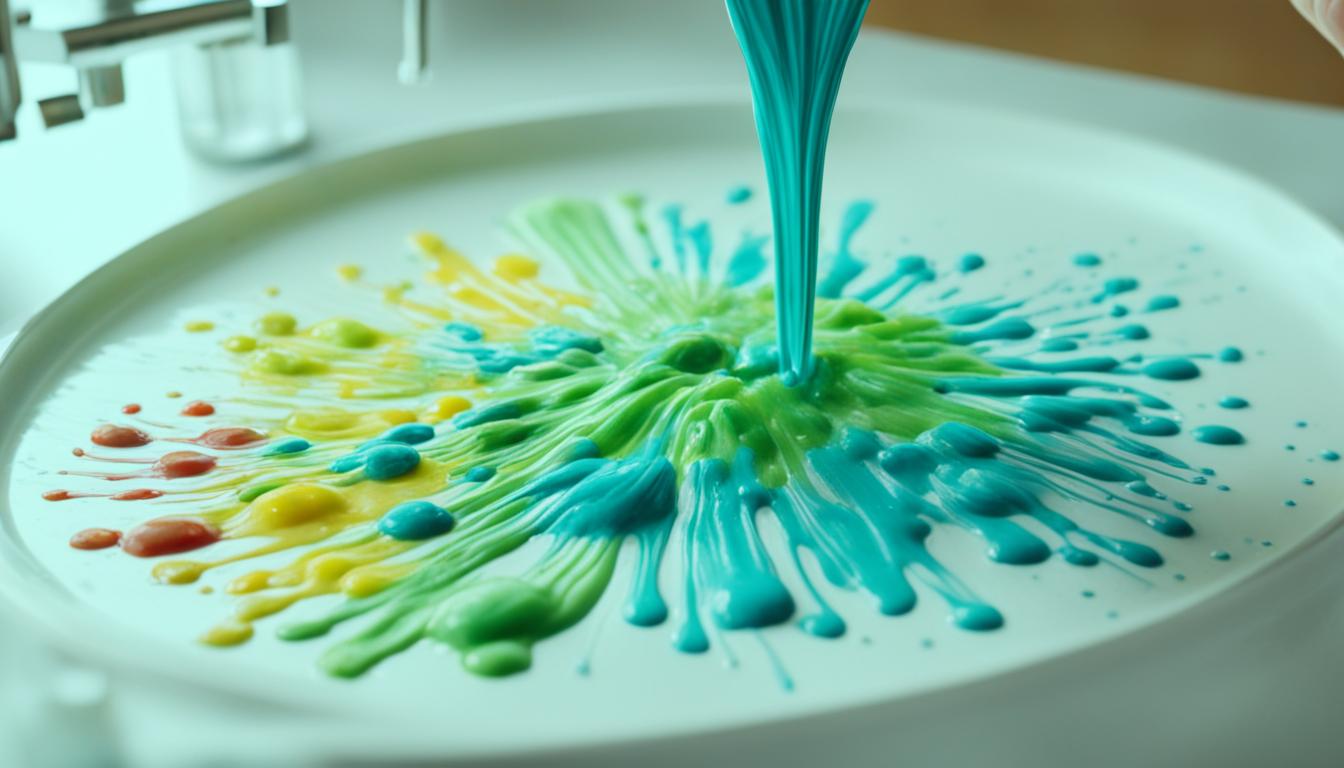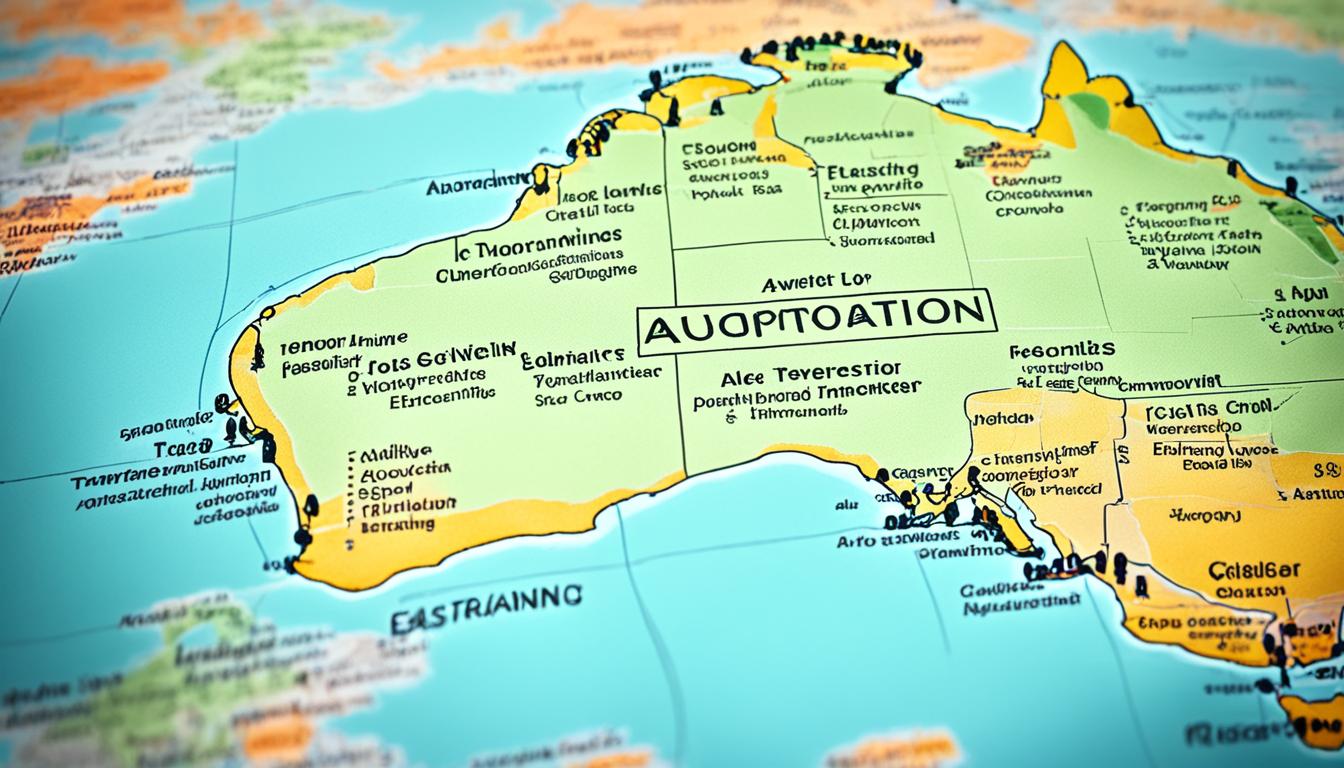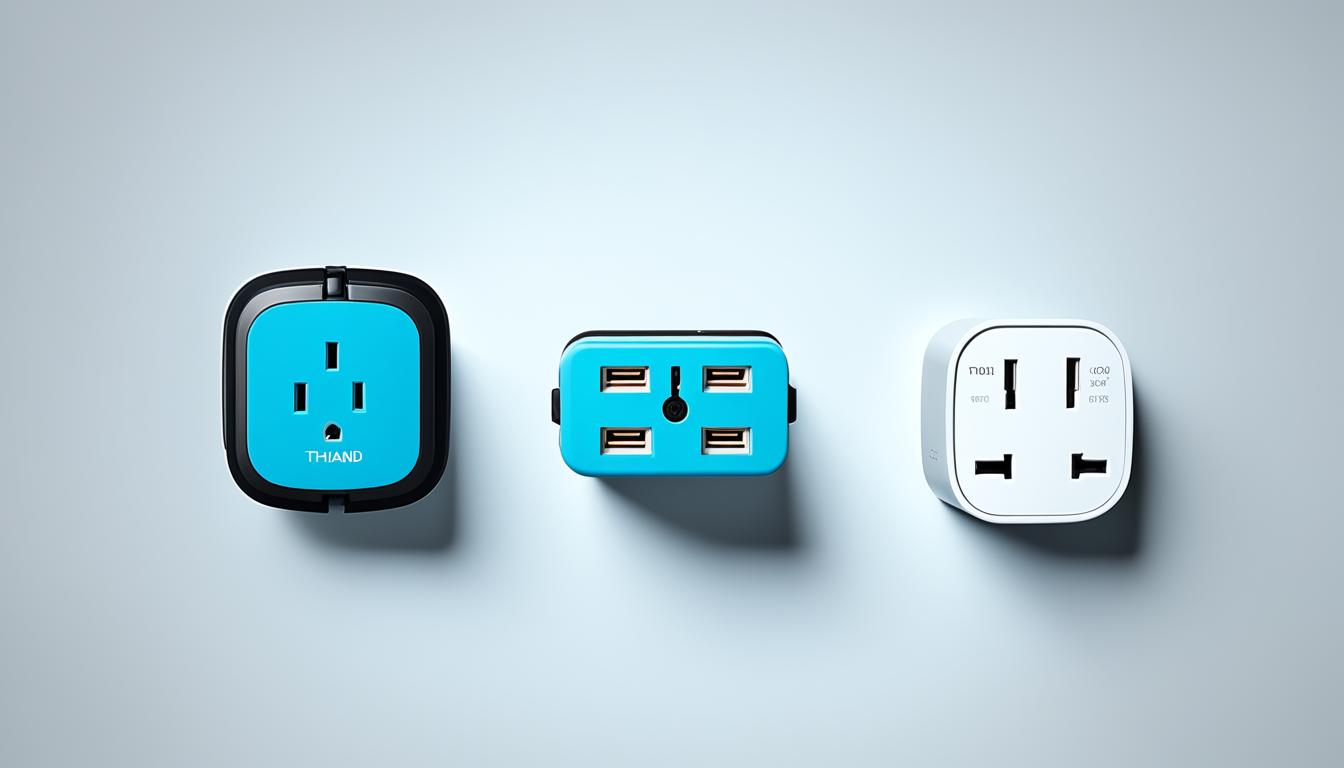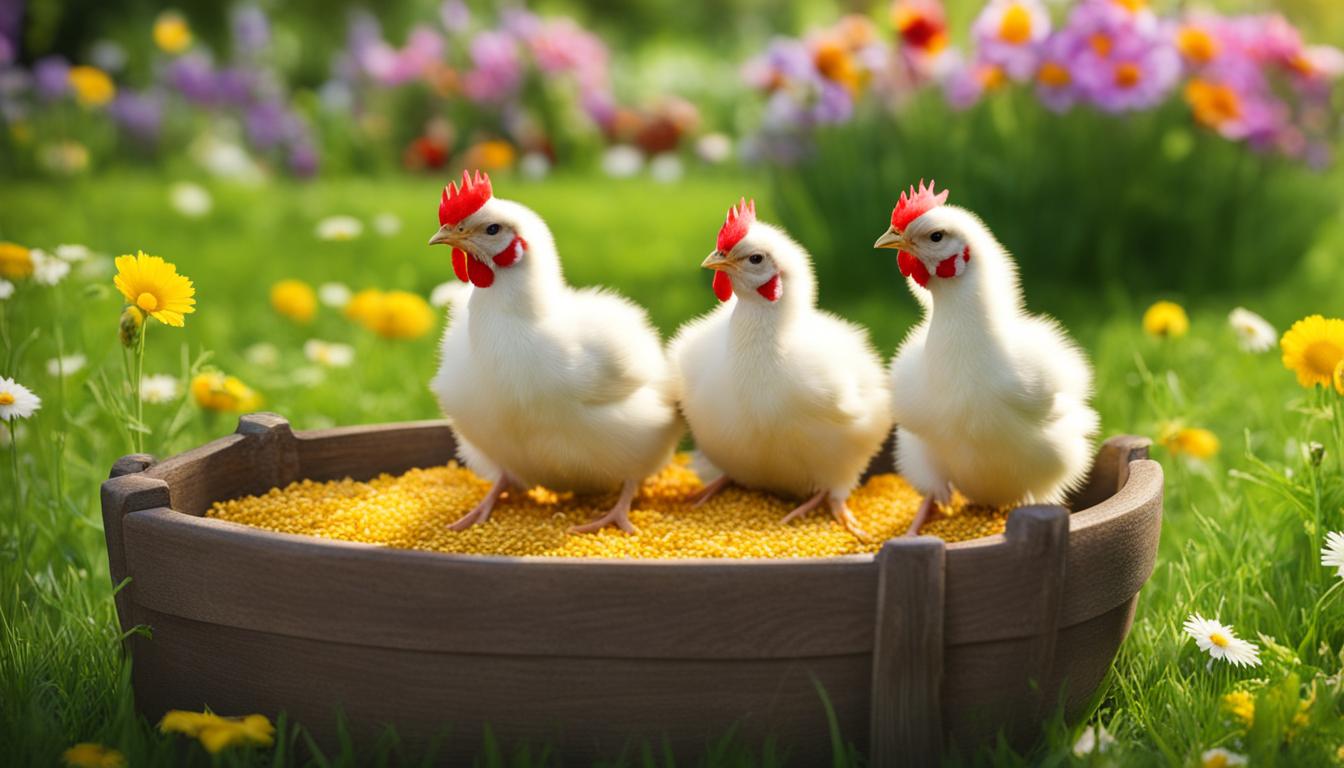
Raising baby chicks is an exciting endeavor, and providing them with the right food is crucial for their growth and health. To ensure your chicks thrive, it’s important to choose the best feed that meets their nutritional needs. By providing a healthy diet, you can support their development and lay the foundation for a strong and productive flock in the future.
When it comes to feeding baby chickens, there are various options available. From organic chick feed to top-rated chick starters, the market offers a range of choices for poultry nutrition. To make the best decision for your chicks, it’s important to consider their essential nutrient requirements and follow a feeding regime that supports their growth and well-being.
Key Takeaways
- Choosing the right baby chicken food is essential for healthy growth and development.
- Organic chick feed and top-rated chick starters provide premium poultry nutrition.
- A healthy diet for baby chicks should include essential nutrients for young chickens.
- Follow a feeding regime that ensures quality feed for the chicks.
When Do Baby Chicks Need to Eat?
Baby chicks do not need to eat immediately after hatching. Instead, they rely on the nutrients absorbed from the yolk sac while still in the egg. Whether you have incubated the eggs or purchased day-old chicks from hatcheries, it is important to give them time before providing feed and water.
For the first 24 hours after hatching, baby chicks can survive without any external sources of nourishment. During this time, they continue to receive essential nutrients from the remaining yolk sac. This natural adaptation allows them to transition to life outside the egg smoothly.
If you have incubated the eggs yourself, it is crucial to resist the urge to offer immediate feed and water. Instead, give the chicks at least 24 hours to fully absorb and utilize the yolk sac reserves before introducing them to their first meal. This waiting period ensures that the chicks’ digestive systems are ready to process feed and helps prevent any unnecessary stress or complications.
If you have obtained the chicks from a hatchery, they are usually shipped and delivered without feed and water. This is because baby chicks can safely survive without nourishment for up to 72 hours after hatching. However, it is still advisable to provide feed and water to the chicks within the first 24 hours to ensure their health and well-being.
It is worth noting that if you set eggs under a hen, she plays a crucial role in showing her chicks how to eat when the time is right. The hen will cluck and peck at the food, encouraging her chicks to follow her lead and learn how to eat. This natural behavior helps the chicks to develop their feeding instincts and ensures they receive proper nutrition from an early age.
Key Points:
- Baby chicks can survive without feed and water for up to 24 hours after hatching.
- They absorb nutrients from the yolk sac while in the egg.
- Whether incubated or purchased, it is important to wait at least 24 hours before providing feed and water.
- If eggs are set under a hen, she will show her chicks how to eat.
How to Teach Baby Chicks to Eat and Drink
Baby chicks are not born knowing how to eat or drink. In the wild, mother hens would show them. When raising chicks yourself, it is important to teach them how to eat and drink.
To teach chicks to eat:
- Scatter feed on the brooder floor to mimic the natural foraging behavior of chicks. Spread the feed evenly to make it accessible and visible.
- Tapping the feed with your fingernail will attract the chicks’ attention and encourage them to peck at the food.
- As the chicks become more comfortable and start eating consistently, it’s advisable to move the feed to a dedicated feeder. This will prevent contamination and make it easier for them to find their food.
To teach chicks how to drink:
- Gently dip the tip of each chick’s beak in the waterer to familiarize them with the drinking process.
- Repeat this process for each chick individually, ensuring that every chick gets a chance to learn how to drink.
- Eventually, the chicks will learn to drink on their own, without the need for assistance.
By following these steps, you can effectively teach baby chicks how to eat and drink, setting them up for a healthy and successful start to life.
| Teaching Method | Advantages | Disadvantages |
|---|---|---|
| Scatter Feed |
|
|
| Dedicated Feeder |
|
|
| Dipping Beak in Water |
|
|
Choosing the Best Chick Starter Feed
When it comes to ensuring the healthy growth and development of your baby chicks, selecting the right chick starter feed is essential. Chick starter feed, also known as chick crumble, is specifically formulated to provide all the necessary nutrients young chicks need to thrive.
Unlike adult chicken feed, chick starter feed is designed in a smaller size, making it easier for little beaks to consume. It comes in a crumbled texture that is highly palatable for chicks, encouraging them to eat without any difficulty.
It is crucial to choose a premium chick starter that offers a complete and balanced diet. These high-quality feeds are developed by poultry nutritionists to meet the specific nutritional requirements of baby chicks. Brands such as Country Heritage and Laucke Mills are known for their top-rated chick starters that have been trusted by poultry enthusiasts for years.
| Brand | Description |
|---|---|
| Country Heritage | A reputable brand known for its premium chick starters. Country Heritage offers a range of options to cater to the diverse needs of baby chicks. |
| Laucke Mills | Laucke Mills is synonymous with quality and excellence in poultry nutrition. Their chick starters are carefully formulated to provide optimal nutrition for healthy development. |
By selecting a premium chick starter feed, you can be confident that your baby chicks are receiving the essential nutrients they need to grow into healthy and productive adult chickens.
Medicated vs. Unmedicated Chick Starter Feed
When it comes to choosing the right chick starter feed for your baby chicks, you have two options: medicated and unmedicated. Understanding the differences between these two types of feed is essential for providing the best care and ensuring the health of your chicks.
Medicated Chick Starter Feed:
Medicated chick starter feed contains a low-dose coccidiostat, which is a medication that helps prevent coccidiosis. Coccidiosis is a common chicken disease caused by the coccidia parasite. The coccidiostat in the medicated feed helps control the growth of the coccidia and prevent the disease from spreading. It is important to note that medicated chick starter should not be fed to chicks that have been vaccinated against coccidiosis or to adult laying hens whose eggs are consumed.
Unmedicated Chick Starter Feed:
Unmedicated chick starter feed does not contain a coccidiostat. This type of feed is suitable for chicks that have been vaccinated against coccidiosis. If you have vaccinated your chicks against coccidiosis, feeding them unmedicated chick starter will provide them with all the necessary nutrition without the need for additional medication.
Choosing between medicated and unmedicated chick starter feed depends on the specific needs of your chicks. If your chicks have not been vaccinated against coccidiosis, it is generally recommended to start them on medicated chick starter to prevent the disease. However, if your chicks have already been vaccinated, you can feed them unmedicated chick starter without any issues.
It is important to consult with your veterinarian or poultry specialist to determine the best feeding option for your chicks. They will be able to provide you with specific advice based on your chicks’ health status and vaccination history.
Comparison of Medicated and Unmedicated Chick Starter Feed
| Medicated Chick Starter Feed | Unmedicated Chick Starter Feed |
|---|---|
| Contains a low-dose coccidiostat | Does not contain a coccidiostat |
| Helps prevent coccidiosis | Suitable for chicks that have been vaccinated against coccidiosis |
| Not recommended for vaccinated chicks or adult laying hens | Provides all necessary nutrition without additional medication |
The Dangers of Homemade Chick Feed
While some sources may suggest making homemade chick feed or feeding chicks on scraps and grains, it is essential to understand the potential dangers associated with this practice. Feeding chicks a homemade diet can lead to nutritional deficiencies, hindering their growth and overall health. Chicks require a balanced and complete diet to thrive, and homemade feed may not provide the necessary nutrients in the right proportions.
Unlike quality chick starters developed by qualified poultry nutritionists, homemade chick feed lacks the careful formulation required to meet the chicks’ nutritional needs. It may result in inadequate levels of essential vitamins, minerals, and other vital nutrients, potentially causing health issues and stunted growth.
Instead, it is highly recommended to opt for high-quality chick starters from trusted brands. These feed options are carefully formulated to provide a complete and balanced diet for young chicks. They contain the ideal combination of nutrients necessary for healthy development, ensuring that the chicks receive optimal nutrition.
“Feeding chicks a homemade diet can lead to nutritional deficiencies, hindering their growth and overall health.”
Benefits of Quality Chick Starters:
- Promote healthy growth and development
- Provide essential vitamins and minerals
- Sustain proper bone and muscle development
- Boost the immune system
- Enhance overall well-being
| Homemade Chick Feed | Quality Chick Starters |
|---|---|
| May lack essential nutrients | Formulated to provide a complete and balanced diet |
| Potential nutritional deficiencies | Meet all nutritional requirements |
| Can result in stunted growth | Promote healthy growth and development |
Ensuring Water Safety for Baby Chicks
Water is essential for the health and well-being of baby chicks. However, it is important to be aware that water can also pose risks to their safety. Chicks can easily drown, even in shallow water dishes, and they are susceptible to respiratory illnesses caused by damp brooders. Additionally, contaminated water from feces can lead to the spread of diseases such as coccidiosis.
The key to ensuring water safety for baby chicks is to take certain precautions. First, it is recommended to use a waterer with a drinking cup or nipple outlet that reduces spillage and prevents contamination. This helps minimize the risk of chicks drowning or sitting in the water. If you choose to use a dish as a water source, placing stones in it can prevent chicks from sitting or drowning in the water.
Regularly cleaning the brooder and monitoring the chicks are essential steps in preventing any water-related hazards. This helps maintain brooder cleanliness and reduces the chances of disease transmission. By practicing good hygiene and ensuring water safety, you can create a healthy environment for your baby chicks to thrive.
Key tips for water safety:
- Use a waterer with a drinking cup or nipple outlet to reduce spillage and contamination.
- If using a dish, place stones to prevent chicks from sitting in it or drowning.
- Regularly clean the brooder to maintain cleanliness and prevent disease transmission.
By following these water safety practices, you can protect your baby chicks from potential risks and promote their overall well-being.
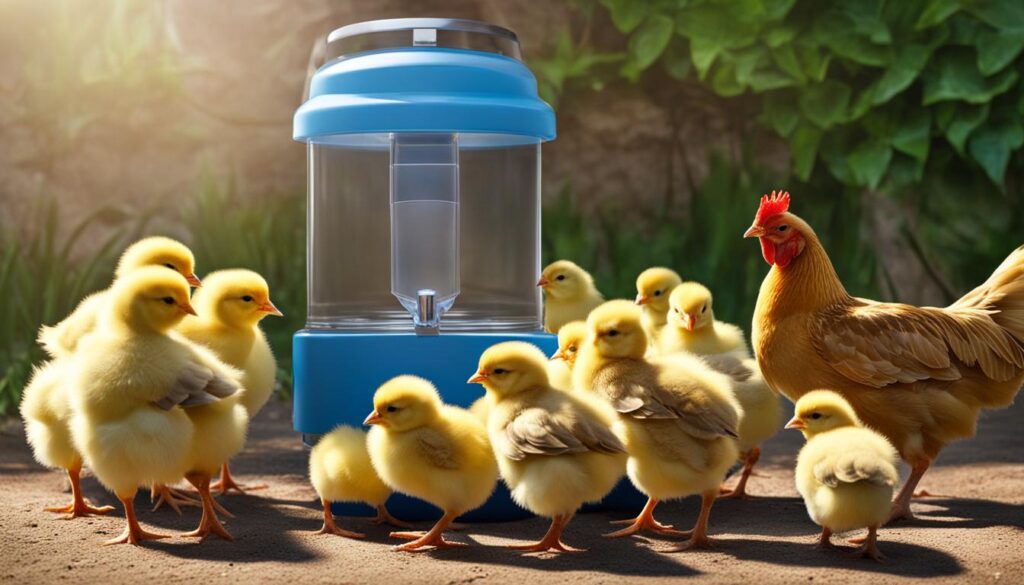
Common Water-Related Risks for Baby Chicks
| Risks | Prevention Measures |
|---|---|
| Drowning | Use a waterer with a drinking cup or nipple outlet. Place stones in a dish to prevent chicks from sitting in it or drowning. |
| Respiratory Illnesses | Maintain a clean and dry brooder. Ensure proper ventilation to prevent dampness. |
| Contaminated Water | Regularly clean the waterer or dish to prevent the spread of diseases. Monitor chicks to prevent feces from contaminating the water source. |
Choosing the Right Treats for Baby Chicks
While baby chicks enjoy treats, it is important to choose the right ones and offer them in moderation. Treats should not be given until the chicks have a complete understanding of their regular feed. Soft treats like fruits and cooked vegetables are a good starting point. Avoid unhealthy treats high in sugar or fat, as these can have negative health effects. Additionally, chicks need access to suitable grit, which aids digestion when they start eating anything other than chick starter feed.
Introducing treats to baby chicks can be a fun way to bond with them and provide some variety in their diet. However, it is crucial to prioritize their health by selecting treats that are beneficial and avoiding those that may be harmful. Soft treats like fruits and cooked vegetables are excellent options to start with as they are easy to digest and provide natural vitamins and minerals.
It is important to remember that treats should be given in moderation and only after the chicks have established a regular feeding routine. Their main focus should still be on their nutritious chick starter feed, which is specifically formulated to meet their growth and development needs.
When selecting treats for baby chicks, avoid those that are high in sugar or fat as they can lead to weight gain and other health issues. Unhealthy treats can also disrupt the balance of nutrients in their diet, potentially causing nutritional deficiencies.
In addition to considering the type of treats, it is essential to provide chicks with suitable grit. Grit is small, insoluble particles such as small stones or sand that help chicks grind up food in their gizzards, aiding digestion. As chicks begin to explore a wider array of foods, grit becomes particularly important to ensure proper digestion.
Choosing the right treats and providing suitable grit can contribute to the overall health and well-being of your baby chicks. By offering nutritious and appropriate treats, you can add some variety to their diet while promoting their optimal growth and development.
Choosing Healthy Treats for Baby Chicks
When selecting treats for baby chicks, keep the following tips in mind:
- Choose soft treats like fruits and cooked vegetables that are easy to digest.
- Avoid unhealthy treats high in sugar or fat.
- Introduce treats only after chicks have established a regular feeding routine.
- Offer treats in moderation to prevent health issues.
The Importance of Grit for Baby Chicks
Grit aids digestion in baby chicks as they start exploring new foods. Providing suitable grit ensures proper digestion and nutrient absorption. Here are some key points to remember:
- Include appropriate grit, such as small stones or sand, in their environment.
- Monitor chicks to make sure they are consuming the grit.
- Consult with poultry experts for guidance on providing the right type and amount of grit.
Preventing Nutritional Deficiencies in Baby Chicks
Baby chicks require a nutritionally balanced diet to ensure their growth and health. While quality chick starter feed provides a complete diet, adding a low-dose vitamin and mineral supplement can provide extra insurance against deficiencies. Supplements like Dine a Chook Mega Mineral are designed for daily use and can help prevent diet-related illnesses. It is important to monitor the chicks for any signs of deficiencies and provide appropriate supplements if necessary.
Chick starter feed is a crucial component of a chick’s diet, providing the necessary nutrients for their growth and development. However, even the highest quality chick starter feed may not always provide all the essential vitamins and minerals in optimal amounts. Vitamin and mineral supplements specifically formulated for chicks can bridge these nutritional gaps and help prevent deficiencies.
A balanced diet is essential for preventing diet-related illnesses in baby chicks. Nutritional deficiencies can lead to stunted growth, weak immune systems, and increased susceptibility to diseases. By supplementing their diet with the right vitamins and minerals, you can ensure that your chicks receive all the necessary nutrients they need for healthy development.
One highly recommended supplement is Dine a Chook Mega Mineral, which provides a comprehensive blend of vitamins and minerals tailored for baby chicks. This supplement is designed to be mixed with their feed or water and can be easily incorporated into their daily routine. It helps to promote strong bones, healthy feathers, and overall vitality in growing chicks.
Regular monitoring of your chicks is essential to detect any signs of nutritional deficiencies. Look out for symptoms such as slow growth, feather abnormalities, decreased appetite, or general weakness. By observing their behavior and appearance, you can identify any potential issues and take proactive measures to address them.
Benefits of Vitamin and Mineral Supplements for Baby Chicks
Providing vitamin and mineral supplements to baby chicks offers several benefits:
- Ensures they receive all essential nutrients for optimal growth and development.
- Strengthens their immune system, reducing the risk of diseases.
- Promotes healthy bone and feather development.
- Enhances overall vitality and well-being.
- Acts as a preventive measure against diet-related illnesses.
With a balanced diet and the addition of vitamin and mineral supplements, you can give your baby chicks the best possible start in life and help them thrive. Remember to consult with poultry nutrition experts or veterinarians for specific dietary recommendations and dosage instructions.
Recommended Vitamin and Mineral Supplements for Baby Chicks
| Product | Description | Benefits |
|---|---|---|
| Dine a Chook Mega Mineral | A comprehensive blend of vitamins and minerals specifically formulated for baby chicks. | Promotes bone and feather development, strengthens the immune system, prevents deficiencies. |
| Other Brands | Various supplements available in the market designed for baby chicks. | Provide additional nutrition to support healthy growth and development. |
Common Deficiencies in Baby Chicks and Their Treatment
Nutritional deficiencies can have serious consequences if left untreated. Baby chicks are particularly vulnerable to deficiencies due to their rapid growth and high nutrient requirements. Two common deficiencies in baby chicks are vitamin E deficiency, also known as crazy chick disease, and vitamin B1 deficiency. It is crucial to recognize the symptoms and provide appropriate treatment to ensure the well-being of your chicks.
Symptoms of Vitamin E Deficiency (Crazy Chick Disease)
- Weakness and lethargy
- Poor muscle coordination
- Poor feather growth
- Swollen hocks
- Enlarged heart
Vitamin E deficiency, commonly known as crazy chick disease, can lead to neurological problems and even death if left untreated. It is essential to provide chicks with a balanced diet that includes sufficient vitamin E or supplement their diet with vitamin E supplements.
Symptoms of Vitamin B1 Deficiency
- Weight loss
- Lethargy
- Loss of coordination
- Tremors
- Seizures
Vitamin B1 deficiency can cause a range of neurological symptoms in baby chicks. It is vital to provide a diet that is rich in vitamin B1 or consider adding a vitamin B1 supplement to prevent or treat this deficiency.
Treatment and Prevention
If you suspect your baby chicks have a vitamin deficiency, it is crucial to take immediate action. Consult a poultry veterinarian or an experienced poultry nutritionist to diagnose the specific deficiency and recommend an appropriate treatment plan. This may include incorporating vitamin and mineral supplements into their diet or adjusting their feed to ensure they receive the necessary nutrients.
Preventing deficiencies in baby chicks starts with providing them with a well-balanced diet. Choosing a high-quality chick starter feed that is formulated to meet their nutritional needs is crucial. Additionally, consider incorporating vitamin and mineral supplements into their diet to provide extra protection against deficiencies.
Proper nutrition is the foundation for the healthy growth and development of baby chicks. Treating and preventing deficiencies will help ensure that your chicks grow into healthy adult chickens.
By monitoring your baby chicks closely and providing them with the necessary nutrients, you can help them thrive and reduce the risk of nutritional deficiencies.
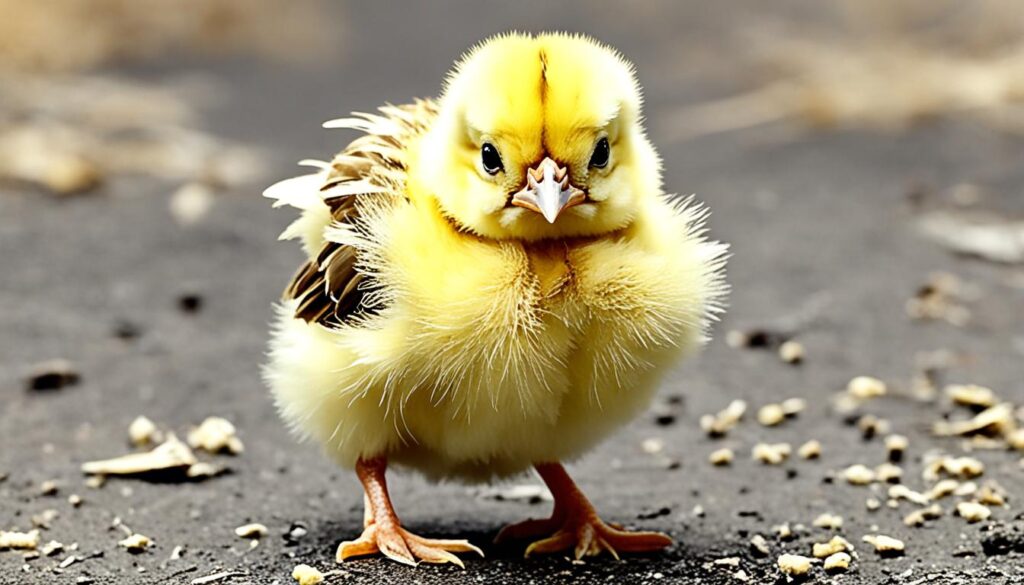
Common Deficiencies in Baby Chicks and Their Treatment
| Deficiency | Symptoms | Treatment |
|---|---|---|
| Vitamin E Deficiency (Crazy Chick Disease) | Weakness, poor muscle coordination, poor feather growth, swollen hocks, enlarged heart | Provide a balanced diet or supplement with vitamin E supplements |
| Vitamin B1 Deficiency | Weight loss, lethargy, loss of coordination, tremors, seizures | Incorporate vitamin B1-rich foods or supplement with vitamin B1 supplements |
Disease Prevention for Baby Chicks
Baby chicks are more vulnerable to illness and disease, so it is crucial to take preventive measures to ensure their health. By implementing proper disease prevention strategies, you can create a healthy environment for your baby chicks and minimize the risk of disease transmission.
Keeping the brooder clean and dry
One of the most important steps in disease prevention for baby chicks is maintaining a clean and dry brooder. Regularly remove any soiled bedding and replace it with fresh, dry material. This helps prevent the buildup of harmful bacteria and reduces the risk of diseases spreading among the chicks.
Practicing good hygiene
Practicing good hygiene practices is essential to disease prevention. Make sure to wash your hands thoroughly before and after handling the chicks or their feed and water. Avoid introducing contaminants to the brooder by wearing clean clothes and footwear. Additionally, clean and disinfect any equipment used in the brooder regularly to eliminate potential sources of infection.
Providing adequate ventilation
Adequate ventilation is crucial for maintaining a healthy environment for baby chicks. Good airflow helps remove excess moisture and ammonia fumes from the brooder, reducing the risk of respiratory problems. Avoid overcrowding the brooder to ensure proper air circulation and provide sufficient space for each chick.
Reducing stress
Stress can weaken the immune system of baby chicks, making them more susceptible to diseases. Minimize stress by providing a calm and comfortable environment. Ensure that the brooder is the right temperature and free from loud noises or sudden changes in light. Handle the chicks gently and avoid unnecessary disruptions to their routine.
By following these disease prevention practices, you can provide a safe and healthy environment for your baby chicks, promoting their overall well-being and allowing them to grow into healthy adult chickens.
Benefits of Raising Baby Chicks at Home
Raising baby chicks at home offers a range of advantages that go beyond the joy of having adorable fluffy companions. Let’s explore the many benefits you can enjoy by embarking on this fulfilling journey.
1. Fresh Eggs
One of the most rewarding aspects of raising baby chicks is the opportunity to enjoy fresh, nutritious eggs straight from your own backyard. By tending to these young chickens, you can ensure a constant supply of flavorful eggs that are free from chemicals and antibiotics.
2. Improved Garden Health
When given access to your garden, baby chicks can have a positive impact on its overall health. These natural foragers help aerate the soil as they scratch for insects, weeds, and larvae, loosening the ground and promoting healthier plant growth.
3. Natural Pest Control
Baby chicks are excellent at pest management and act as natural exterminators. They eagerly hunt and devour garden pests, such as slugs, snails, and various insects, reducing the need for harmful chemical pesticides.
4. Reduction of Food Waste
Raising baby chicks is an eco-friendly choice that can help minimize food waste. These little creatures happily consume kitchen scraps, turning them into valuable nutrients and reducing the amount of organic waste that ends up in landfills. It’s a win-win situation for both your chicks and the environment.
5. Family Pets
Aside from their practical benefits, baby chicks also make fantastic family pets. They provide an excellent opportunity for children to learn about responsibility, empathy, and the circle of life. Caring for and interacting with these feathered companions can create lasting memories and a sense of connection with nature.
Now that you know the numerous advantages of raising baby chicks at home, it’s time to embark on this enriching experience and discover even more benefits along the way.
The Essential Nutrients for Baby Chicks
Baby chicks require a nutrient-dense diet to support their optimal growth and development. Providing them with the right balance of essential nutrients is crucial for their overall health and well-being. Here are the key nutrients that baby chicks need:
Protein
Protein is essential for muscle and bone growth in baby chicks. It plays a crucial role in building strong bodies and promoting healthy development. A protein-rich diet ensures that chicks have the necessary building blocks for growth and vitality.
Vitamins and Minerals
Vitamins and minerals are vital for the overall health and proper functioning of baby chicks. They support various physiological processes and help boost the immune system. Vitamin A, vitamin D, and calcium are particularly important for skeletal development, while vitamin E and selenium play a role in preventing diseases.
Grains
Grains provide baby chicks with essential carbohydrates, fats, and proteins. These macronutrients provide the necessary energy for growth and development. Including a variety of grains in their diet ensures a well-rounded nutrient profile and helps meet their dietary needs.
Fats
Fats are an important component of a baby chick’s diet. They provide a concentrated source of energy and aid in the absorption of vitamins and minerals. Including healthy sources of fats, such as vegetable oils or animal fats, helps support the chicks’ overall nutritional needs.
Water Intake
Water is vital for baby chicks as it helps regulate body temperature, aids in digestion, and supports overall hydration. Baby chicks require a significant amount of water relative to their size, and ensuring they have access to clean and fresh water at all times is essential for their well-being.
Providing baby chicks with a nutrient-dense diet that includes adequate protein, vitamins, minerals, grains, fats, and water intake is crucial for their optimal growth and development. By meeting their dietary needs, you can help ensure that your baby chicks grow into healthy adult chickens.
Conclusion
Providing optimal nutrition for baby chicks is crucial for their healthy development. By choosing high-quality chick starter feed, ensuring water safety, and taking preventive measures against deficiencies and diseases, you can give your chicks the best start in life and promote their overall well-being.
Feeding your baby chicks with a quality feed is paramount. Look for reputable brands that offer premium chick starters formulated by poultry nutritionists. These feeds provide a complete and balanced diet, containing essential nutrients necessary for healthy growth and development.
Moreover, water safety is vital for your chicks. Choose appropriate waterers that prevent drowning and contamination, keeping their brooder clean and dry. Good hygiene practices, proper ventilation, and stress reduction are all crucial in preventing diseases and promoting a healthier environment for your baby chicks.
Remember, consulting with experts and reliable sources is always recommended to ensure you have the most accurate information on feed, nutrition, and care for your baby chicks. By following these best practices, you can raise healthy chicks and witness their growth into thriving adult chickens.

